Alice's Table 10 years of writing history which touched a chord with generations of Gibraltarians
Photo by Johnny Bugeja
One event this week has been in the making for most of my life. A hugely important stand out moment in my personal life – one I always knew would one day come. It saw another chapter of my life – both personal and professional – come to an end as I carefully chose its final words and opened a new chapter with a bunch of new words to go with it. For those of you who may not know, for over 10 years I was researching and writing a book on my father – the well-known local journalist and broadcaster – Manolo Mascarenhas and his ‘Palabras al Viento’. The book is now complete, published and launched this week by Gibraltar Cultural Services. It will feature on the last day of the festival as part of this year’s Gibunco Gibraltar Literary Festival.
But more about that in a couple of weeks’ time when I will visit my long-established-connection and journey with the festival since its inception: as a reporter, a keen supporter, as one involved in interviewing and introducing, and just enjoying being part of this amazing cultural experience. And this year for the first time also featuring in it as well in my own right.
This week, these words – for Alice's Table – were written just a couple of days ago. In fact, if I am honest, almost at the very last minute. Why? Well, I took a short break because of brain fog – I have never experienced this before. I kept opening the page for the next Alice’s Table but the words in my head just did not land on the page.
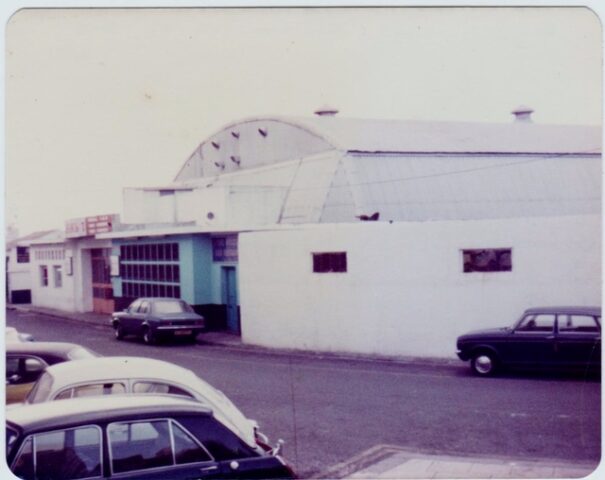
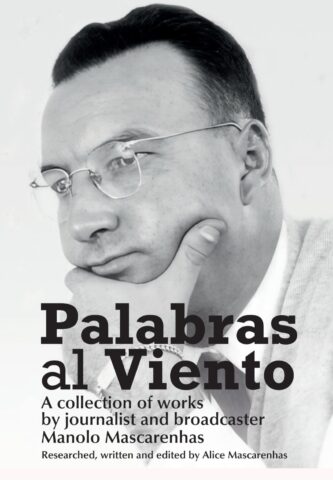
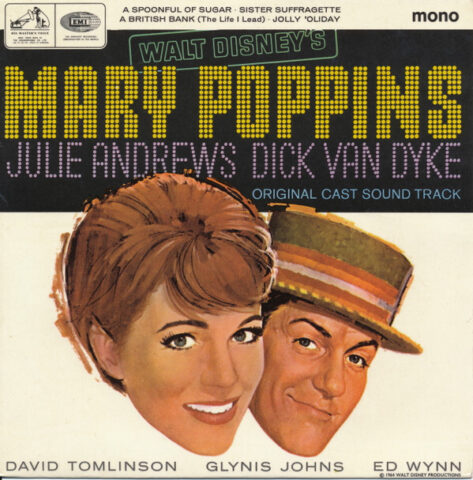
But I got back to it last week and with the help of another historical guide and directory. Then this week - to be honest I was not sure I wanted to write about what I knew I had to write about. I had no reason for feeling like this. But as my deadline to deliver my copy drew closer – and finding myself turning away from my computer not wanting to write about it – I knew I would have to force myself because you – the readers - were probably expecting me to do so. But once I had my opening line (often the case) within an hour and a half I had written it. I admit, a little annoyed because I had been through twists and turns with no light at the end of the tunnel. But I got there.
Frankly, it is easier to write about other people, their achievements and their goals, than it is to write about oneself and one’s own ideas and special moments. I really believe that when I write about other people at this Table – it is their stories that are truly important, many of them presenting us with a part of our history which we must not forget – and in all these cases I see myself just as the instrument that takes it onto the page.
Should I use this column to write about this book and my experience?
Chronicle Editor, Brian Reyes, and Features Editor Gabriella Ramagge, had no doubt when I raised my doubts with them last week. And even with their blessing it took another week to get here. But it is about our history, over 40 years. How could I not give it a mention?
Especially when I am always encouraging others to write their stories because I genuinely believe it is vital they do not get lost in the vaults of local history.
Then I thought about what this book which I have titled ‘Palabras al Viento’ represented. What it says about this community – the significance of what my father wrote about, and why and what he wrote, what his words meant to everyone at an important crossroads in Gibraltar’s history. How his words have remained relevant throughout all this time – yes, for over sixty years.
The book could not have carried any other title. In his ‘Palabras al Viento’, a radio programme which aired every Sunday afternoon at 2.30pm on Radio Gibraltar over a five-year period from 1965 to 1970, my father, Manolo Mascarenhas, became the voice of the people of Gibraltar. This community put their trust in him to defend every one of them against the growing Anti-Gibraltar Spanish campaign initiated by the dictatorship which at the time ruled our neighbouring country, Spain. Every week there were more restrictions at the frontier, accusations – and untruths about this community – all of which were carried weekly in the Spanish Media – newspapers, radio and television.
My father rose to the challenge and defended our truths and our rights as a people. The programme first went on air in January 1965. It has often been said one could walk from the Lighthouse to the Frontier and listen to his every word in the weekly broadcast where the radios were tuned into Radio Gibraltar in all local households. Families, neighbours and friends gathered to listen to his every word. It also had a following across the frontier where they listened at a low volume.
With his ‘Palabras al Viento’, he lifted the spirits of the Gibraltarians. He encouraged the community to believe that whatever the outcome – and we all know this would lead to the eventual closure of the frontier in 1969; in the Rock’s 15th siege – we would endure as a community and survive as a people in our own right. My father and other journalists of the day inspired and encouraged this community to move forward and to not look back.
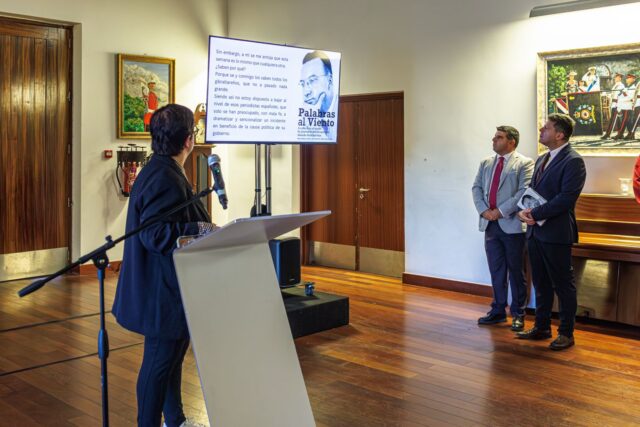
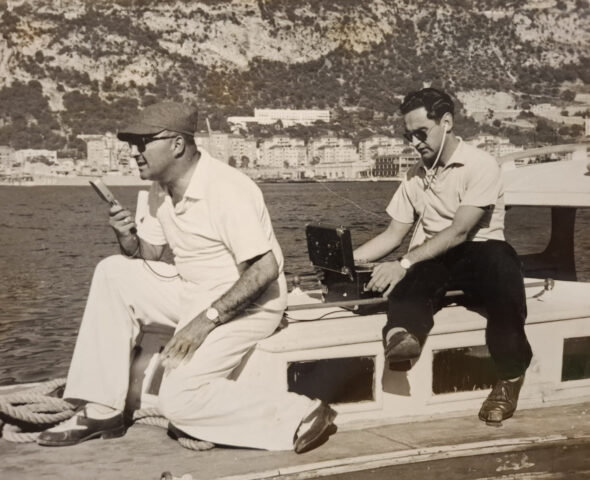
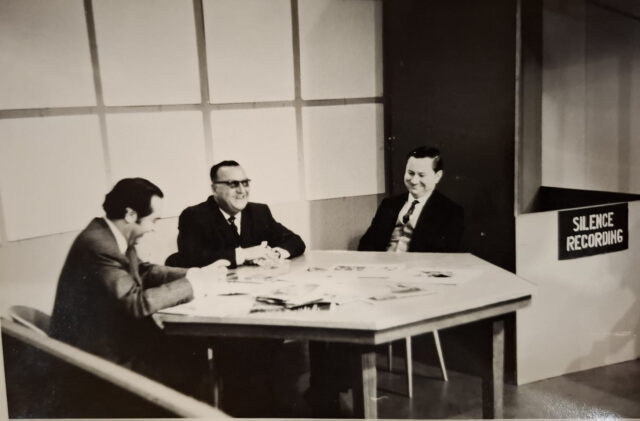
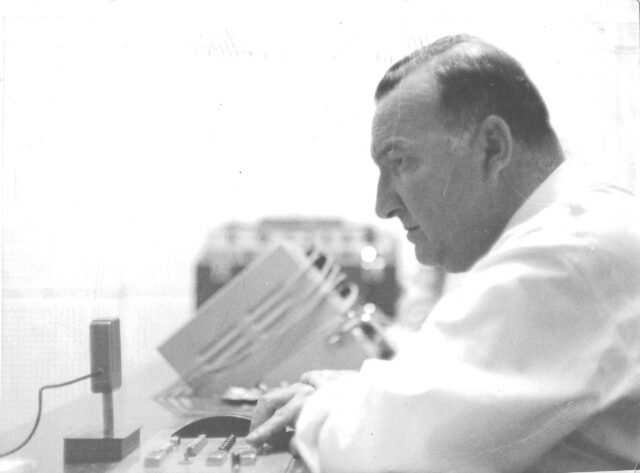
But the book ‘Palabras al Viento’ is far more extensive than the radio news programmes – it features many of my father’s writings in most of the newspapers published in the Gibraltar post war years. Journalism for him began with his columns on bullfighting, on culture and his love of the theatre. Later would come sports, and his columns writing as Cyril Perkins in the Gibraltar Post. His writings in Spanish featured in earlier newspapers such as El Anunciador, Luz and Deportes. Then came the Gibraltar Telegraph where his sports columns first took shape. Piecing it together, I soon realised, when read as one volume of work it gives us a good insight into a community rebuilding itself in the years following the Second World War. Add to this his Radio Gibraltar and GBC TV days (he was one of the pioneers on Radio Gibraltar having joined in 1958, later Head of News and Production on television, and GBC General Manager), then pages of local history (in local newspapers) covering the period from 1946 to 1972 – and it is all about our history in many different aspects – and all leading to his political comments in the run-up to the closure of the frontier, and Gibraltar society as a whole. It is also an insight into our journalism and the role journalists like my father played in helping to create the people and community we are today.
So, in simple truth, I could not shy away from writing this column this week about a book which has taken me 10 years to write and research – and which helped me discover a little about myself as well and at the same time also got to know my father a little better.
How I got to write what you have read so far – and the thought process involved – was a little scatty and disjointed. I don’t often share with you how this column gets written and how I arrive at the words you read every week on the page. To be honest this week it was the most long-winded and confusing ever, even for me. But I got there.
I had been looking at some important anniversaries celebrated this year – and which in some cases helped to shape our lives. Of course, it all began with the 60th anniversary of ‘Palabras al Viento’. But this year is also 60 years since the very first Gibraltar Song Festival which began as a completely local event and soon turned international (already planning this for Alice’s Table). Personally, I have very strong memories of that first edition of the festival.
Well, all this got me thinking about events in our lives that unknowingly we carry throughout our lives, and which have quietly influenced us, which meant so much and to which we kept on returning (often without realising it). In my case mostly cultural – but I guess it would be the same for many of us. There are books, plays, songs, concerts, films, television shows, political events and umpteen community and personal moments - both shared and as individuals– such as special birthdays.
I do not often delve into social media – but Julie Andrews turned 90 this month (how is that possible and where has the time gone?) and up popped on X and other platforms videos of her life. To be honest most I ignored. But there was this one video of people from all over the world wishing her a happy birthday and expressing what she has meant in their lives. It was made up of people of all ages from five to 90!
And it was remarkable because they all told the same story how Andrews had been present throughout their entire lives – in their ups and downs – as Maria Von Trapp in the Sound of Music (the film The Sound of Music turned 60 this year as well – the film has been around throughout my entire life – I remember seeing it for the first time at the old Regal Cinema). Their messages included the joy she had given them all as Maria and as Mary Poppins and in all she has done – of course the latest being the voice of gossip columnist Lady Whistledown in Bridgerton. I was touched because they had all been touched by her – and I felt the same – for this was a friend who had shared so many magic moments with me as well.
As I continued to search for other instances. I remembered Bohemian Rhapsody is 50 years old this year. It still sounds as fresh and new, and as inspiring as the first time I heard it on Radio Gibraltar on the Thursday 8pm Top 20 Show and probably on George’s Collection on Friday at 9pm. Last week the BBC played 40 Hits of 1975 and Bohemian Rhapsody, which spent a total of 14 weeks at number one on the UK Singles Chart, despite its controversial running time of 5 minutes and 55 seconds, was the best. To think it may not have happened if Queen had not believed in their album ‘A Night at the Opera’. They fought to release it, and the single… and it worked.
It is also 40 years since Live Aid – and eventually watching all those groups and singers performing live was soul searching. Many of those songs performed on that day have become classics and firm favourites on my playlist. I don’t know about you, but I am willing to bet Bohemian Rhapsody is on that list.
40 years ago, I also visited The Palace Theatre to see a new show which had just transferred from the Barbican Centre but had been born in France. It was Les Miserable. Michael Ball, Colm Wilkenson and Patti Lupone all entered my life for the very first time. They are still with me today and Les Mis is on my playlist at least twice a week.
I guess what I am trying to say is that although many of us will brush all the old aside there are these defining moments in our history which always continue to live in us – and may even keep us dreaming.
Kept alive because we can still remember – where you heard that song for the first time, what you were doing, where you watched that film for the first time and who with that line in a book you so often repeat. And all treasured moments all kept alive because collectively we are all part of their history, and they a part of ours. Take the year (1974) Abba appeared on the scene and took the Eurovision Song Contest by storm with ‘Waterloo’. That was an explosion that reverberated across the world – and we still want more as we continue to flock to the AI generated experience of Abba Voyage. Haven't seen it yet? Just jump on the bandwagon. I guarantee you will not be disappointed because a great part of the enjoyment is seeing how younger generations are feeling what you felt in 1974.
I don’t want to reflect on all the years that have gone by. But on how these key instances – which I can still remember clearly – have influenced me in my life, and why they are still with me today. How they touched me. I believe life is not about concentrating on the volume of years but on the volume of influence (small explosions) and richness of these treasures which remain like golden memories, shaped us into the people we are today – for me it is ripples of cultural moments which I continue to hang on to and still matter the most.
This is how this week’s column was really born. I know. Odd, don’t you think? I really had no idea where I wanted it to take me. But I guess it all kind of reinforces why I am still writing this column eight years down the line and what history means to me – it is all about our stories, our experiences. The impact of words. How ‘Palabras al Viento’ even now remains on people’s lips. Aside from my father’s distinct recognisable and powerful voice… His words also touched generations of Gibraltarians in their sincerity and their truth.









